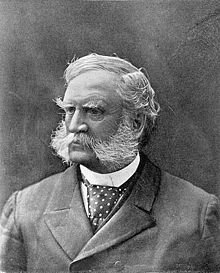George W. Morgan
| George Washington Morgan | |
|---|---|

George W. Morgan, 1892
|
|
| Member of the U.S. House of Representatives from Ohio's 13th district |
|
|
In office March 4, 1867 – June 3, 1868 |
|
| Preceded by | Columbus Delano |
| Succeeded by | Columbus Delano |
|
In office March 4, 1869 – March 3, 1873 |
|
| Preceded by | Columbus Delano |
| Succeeded by | Milton I. Southard |
| United States Ambassador to Portugal | |
|
In office 1858–1861 |
|
| Preceded by | John L. O'Sullivan |
| Succeeded by | James E. Harvey |
| Personal details | |
| Born |
September 20, 1820 Washington County, Pennsylvania |
| Died | July 26, 1893 (aged 72) Fort Monroe, Virginia |
| Resting place | Mound View Cemetery, Mount Vernon, Ohio |
| Political party | Democratic |
| Spouse(s) | Sarah H. Hall |
| Children | two |
| Alma mater | Washington & Jefferson College |
| Military service | |
| Allegiance |
United States of America Union |
| Service/branch |
United States Army Union Army |
| Years of service | 1846–1848, 1861–1863 |
| Rank |
|
| Commands | 15th Infantry Regiment |
| Battles/wars | |
George Washington Morgan (September 20, 1820 – July 26, 1893) was an American soldier, lawyer, politician, and diplomat. He fought in the Texas Revolution and the Mexican-American War, and was a general in the Union Army during the American Civil War. Morgan later served as a three-term postbellum United States Congressman from Ohio.
Morgan was born in Washington County, Pennsylvania, to a prominent family. His grandfather, Col. George Morgan, was the first to give President Thomas Jefferson the information regarding Aaron Burr's conspiracy. G. W. Morgan was educated in local schools, and then in 1836, he withdrew from Washington College at the age of 16 and enlisted in a military company that was commanded by his older brother, Thomas Jefferson Morgan. They traveled south to Mexican Texas to fight in the struggle for independence from Mexico. Morgan received a commission in the regular Texas Army under Sam Houston as a lieutenant, and rose to captain commanding the post at Galveston. He served with Captain Robertson's rangers and Company B of the First Regiment of Texas Rangers. He resigned in 1839 to return to Pennsylvania.
...
Wikipedia
